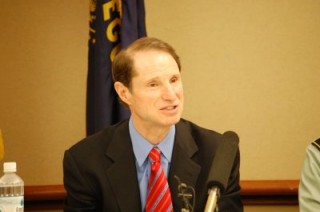 Members of an Oregon National Guard unit have made complaints about medical care they are receiving or have received from the Regular Army in a throwback to the Weekend Warrior mentality of active duty Regular Army prior to the invasions of Iraq and Afghanistan. Well, frankly an RA attitude of the Guard as weekend warriors was held as the Guard really did transform from an expectation of being weekend warriors to becoming part of the Total Force. We believe that the Guard has earned the right to have that attitude pushed back to the Vietnam War Era when the National Guard truly were weekend warriors enlisting to avoid combat.
Members of an Oregon National Guard unit have made complaints about medical care they are receiving or have received from the Regular Army in a throwback to the Weekend Warrior mentality of active duty Regular Army prior to the invasions of Iraq and Afghanistan. Well, frankly an RA attitude of the Guard as weekend warriors was held as the Guard really did transform from an expectation of being weekend warriors to becoming part of the Total Force. We believe that the Guard has earned the right to have that attitude pushed back to the Vietnam War Era when the National Guard truly were weekend warriors enlisting to avoid combat.
In order to politically avoid the publicly unpopular Selective Service Draft, but to have the adequate bodies needed to sustain wartime operations tempo of multi-deployments to two war zones, the Pentagon and Congress has exploited the use of each state’s National Guard. While this approach of avoiding THE DRAFT allows the vast majority of Americans’ to not have to relate to the war(s) that only our federal government, Pentagon, and war profiteers are committed to, it is our National Guard troops and families who take the heat.
In comparison to the Vietnam War or even Gulf War One, our National Guard has not been used to this degree of operations tempo (multiple deployments) since WWII a war our nation was no shit committed to, and Korean War the last time that Army National Guard units were called up in large numbers and actually sent to war.
Now, it appears that exploiting and abusing this reserve force in order to avoid the draft is having growing pains beyond Stop Loss and recall of the IRR. However, as with every story, there are two (or many) sides, and we wish to explore these Guard troops allegations, how wide spread this situation is in other states outside Oregon, is this an isolated case as Oregon National Guard leaders, senior officers, and DoD claim, and the Pentagon’s response to it at various levels.
Robert L. Hanafin, Major, U.S. Air Force-Retired, VT News Network
Oregon politicians want Guard medical care reviewed
 Back on 17 May 2010, Peter Urban of the Washington Bureau of Gannett News Service reported that two U.S. Congressional representatives from Oregon called for an investigation into the quality of medical treatment provided to National Guard and Reserve troops before and after combat deployment to Iraq (and by extension Afghanistan).
Back on 17 May 2010, Peter Urban of the Washington Bureau of Gannett News Service reported that two U.S. Congressional representatives from Oregon called for an investigation into the quality of medical treatment provided to National Guard and Reserve troops before and after combat deployment to Iraq (and by extension Afghanistan).
Sen. Ron Wyden and Rep. Kurt Schrader sent joint letters to the Inspector General of the Army, and the Government Accountability Office (GAO)  demanding an investigation after their offices uncovered evidence that Joint [Air Force-Army] Base Lewis-McChord in Washington State treated active-duty soldiers differently [superior to] from National Guard members and reservists returning from Iraq and Afghanistan.
demanding an investigation after their offices uncovered evidence that Joint [Air Force-Army] Base Lewis-McChord in Washington State treated active-duty soldiers differently [superior to] from National Guard members and reservists returning from Iraq and Afghanistan.
Senator Wyden and Congressman Schrader also wrote to Army Secretary John McHugh asking him to investigate their concerns that returning National Guard members and reservists are being treated as “second-class Soldiers.”
VT Editorial Comment: Although the focus is Oregon State National Guard troops and we highlight STATE, the implications of what these two politicians from Oregon are demanding our federal government do applies to National Guard and Reserve units from all states, and territories.
U.S. Rep. Kurt Schrader, D-Ore., and Sen. Ron Wyden, D-Ore., wrote the Secretary of the Army that members of the 41st were “systematically denied their benefits.” In other letters, the congressmen asked the Defense Department’s Inspector General and the Government Accountability Office to investigate whether the Army also discriminates against National Guard troops nationwide.
“Although many senior officers realize that all soldiers deserve to be treated with respect and receive all the benefits they’ve earned, a culture of discrimination against the Reserve component seems to still permeate some aspect of the Army,” they wrote in a May 17 letter.
“I am outraged after hearing troubling reports about the disrespectful and inequitable treatment received by Oregon Guardsmen,” Schrader said in a news release issued with Wyden. Schrader wants all the [Oregon National Guard] soldiers’ cases to be reviewed. Some National Guard members have already been released without receiving appropriate medical treatment, he said. In the letter to Army Secretary McHugh, Schrader asked that he “personally ensure their proper care and treatment.”
Congressman Schrader’s staff members were alerted to potential problems at the former Fort Lewis [now Lewis-McChord Joint Army-Air Force Base] from a constituent complaint. They received several more complaints and, upon further investigation, found evidence that the problem may be broader, they said. In particular, they said that a PowerPoint presentation created at the base showed that Lewis-McChord had instituted a process for handling the medical needs of active-duty soldiers differently from those of National Guard members and reservists.
The presentation included an image labeling National Guard soldiers as “weekend warriors.”
“We can’t just chalk this up as the actions of one rogue officer; rather my concern is that this is a symptom of a culture that views National Guard and reservists as second-class soldiers,” Wyden said.
Back in June 2009, Senator Ron Wyden (D-Ore.) introduced several bills in Congress that may have fixed the problems faced by Oregon constituents in 2010.
In fact, Senator Wyden announced on June 29, 2009 (almost a year ago-hope he’s not up for re-election) that he would introduce legislation to Congress which will provide a “soft landing” for military members returning from deployment. He met with members of the Oregon National Guard leadership, Oregon Department of Veterans’ Affairs and Family Support Groups at Portland State University on June 29, 2009 to review new legislation he planned to introduce to Congress on July 5, 2009 that would have provided a “soft landing” for military members returning from deployment
This is part of the promise our state made to take care of our troops
“We need a transition from the trauma of combat to the serenity of home in Oregon,” Wyden said. “And this is part of the promise our state made to take care of our troops.”
The Senator said he planned to introduce the bills to Congress following the July 4 2009 recess. The five separate bills included provisions which will help service members wounded in combat to find employment within their particular service; expand on key components of the Military Family Leave Act; enhance mental health counseling and treatment for returning service members; and help veterans make informed healthcare decisions about their local VA hospital by providing patients with a semi-annual ‘report card’ of the facility.
The Soft Landing Reintegration Act of 2009
The key legislation of the group is the Soft Landing Reintegration Act of 2009, which allows service members deployed in a homeland defense mission for more than 180 days to remain on active duty for up to 90 days following their return. The legislation allows for the continuation of entitlements and pay, as well as access to reintegration services.
VT Editorial Comment: The current status of Senator Wyden’s Soft Landing for Our Troops Bill is that it pretty much died in committee with only one, count them, one cosponsor. Simply put the effort was token and meaningless without significant co-sponsors and the backing of Democratic leadership in Congress behind Senator Wyden, there was NONE.
S .1426 — National Guard and Reserve Soft Landing Reintegration Act (Introduced in Senate) http://thomas.loc.gov/cgi-bin/bdquery/z?d111:s.01426:
 The last ACTION (if readers want to call it that) taken by Congress that reflects how serious Senator Wyden’s bill was taken happened on: 7/9/2009 Referred to Senate committee. Status: Read twice and referred to the Committee on Armed Services. Readers that was what over 9 months ago.
The last ACTION (if readers want to call it that) taken by Congress that reflects how serious Senator Wyden’s bill was taken happened on: 7/9/2009 Referred to Senate committee. Status: Read twice and referred to the Committee on Armed Services. Readers that was what over 9 months ago.
Former Oregon Army National Guardsman, Luke Wilson, said he wished the Wounded Warrior Retention Act was in place when he returned from Iraq in 2004. Wilson, who was hit by a rocket-propelled grenade while deployed to Iraq with the Oregon Army National Guard’s 2nd Infantry, 162nd Brigade, spent a year of grueling physical therapy at Walter Reed Army Medical Hospital after he lost a leg.
What then followed added insult to injury, he said, when the Army refused to allow him to stay in, but also refused to allow him to rejoin his unit for their homecoming. He said it seemed that story changed almost daily while he was recuperating from his wounds.
“When I was at Walter Reed, one guy was telling me one thing and another guy was telling me something else,” Wilson said. “It was so confusing.”
He said the legislation will put in place a clear set of standards and practices for all services. Wilson said if the Army had allowed him to stay in the military, he would have done so in a ‘heartbeat’.
“I might not be able to run two miles like I used to,” Wilson said. “But I can sit behind a desk and calculate someone’s pay as well as the next guy.”
Donna Herr, who represents one of the Oregon National Guard Family Support Groups, said because Oregon lacks a full-time, active duty base, a lot of the built-in support network that comes with the active duty military is not available to Oregonians. Something as simple as daycare for a working spouse while their husband or wife is deployed becomes an extreme hardship, Herr said.
“A base environment would have helped,” she said.
Herr added that proposed changes to the Military Family Leave Act of 2009 would allow individuals up to two weeks of unpaid leave to help ease the transition of their deploying spouse.
Despite Senator Wyden’s gallant legislative efforts with one co-sponsor and no backing from Congressional leadership, the Senator was forced to write a letter of complaint to the Secretary of the Army about a year later prompting the Army Surgeon General to send an apology in return.
 The Pentagon and Congress says You can Forget the Soft Landing Reintegration Act of 2009, resubmit in 2010 or 2011, and BTW we apologize for any inconventience to Army National Guard troops.
The Pentagon and Congress says You can Forget the Soft Landing Reintegration Act of 2009, resubmit in 2010 or 2011, and BTW we apologize for any inconventience to Army National Guard troops.
Army Surgeon General Eric Schoomaker sent a letter to Senator Wyden apologizing for the Weekend Warrior PowerPoint presentation, which had been presented in March 2010 to staffers at Madigan Army Medical Center, located near Lewis-McChord, and saying he was “appalled by the insensitivity” of one of his officers. Schoomaker said the commanding general of Lewis-McChord had also directed an investigation to “define the scope of the problem, look thoroughly into all issues, and provide recommendations for action to improve operations involving the Joint Mobilization Brigade, the Warrior Transition Battalion, the Soldier Readiness Center, and demobilization involving Reserve Component Soldiers.”
On 18 May 2010, Julie Sullivan of the Oregonian reported in her article, Guardsmen Say Care 2nd-Class that some Oregon National Guard troops needing medical care are complaining about being hustled off active duty too soon.
She notes that between tours in Afghanistan and Iraq, Sgt. Jason Greenlees broke his left leg. He recovered and redeployed to Iraq. But after wearing 60 pounds of body armor daily for 10 months while guarding convoys in Iraq, the Oregon Army National Guard soldier’s leg swells and pain wakes him. It “hurts like hell,” he says, just to walk.
Army doctors say Greenlees needs surgery. So when Army staff at Joint Base Lewis-McChord in Washington told him to return to Portland and his own [private] doctor earlier this month, Greenlees refused. He says the Army is wrongly forcing as many as 185 injured soldiers from the 41st Infantry Brigade Team off active duty. He says they accused some troops of feigning injuries [malingering] to extend their active-duty paychecks, which can be thousands of dollars more than their Guard pay. At least 40 injured Oregon soldiers remain at Lewis-McChord, weeks after their units demobilized after 10 months in Iraq.
“They were completely unwilling to help us because they see us as weekend warriors,” Greenlees said. “We’re actually injured. We’re trying to get the care we deserve and they’re fighting it every step of the way.”
Staff materials prepared for the 41st demobilization this spring at Madigan Army Medical Center at Lewis-McChord depicted active-duty soldiers as a combat-ready GIs, while Guard soldiers were depicted as an empty baseball cap with the words, “Weekend Warrior.” The materials warned that some Guard and Reservists may be gaming the system to avoid service or earn more money.
“That got me very, very upset,” Rep. Schrader said, “You know, after two or three or four deployments, you can’t say that about the National Guard.”
One Army spokesman said it takes the Oregon Guard’s concerns “very seriously.” Lt. Gen. Charles Jacoby Jr., commanding general at Lewis-McChord, has ordered an investigation.
“Although we can’t discuss the details surrounding the investigation, we can assure you that Madigan remains committed to providing quality and timely health care to all returning Soldiers from deployment,” Jay Ebbeson, a spokesman for Madigan.
In April 2010, members of Oregon’s 41st Infantry Brigade began to arrive at Lewis-McChord where tens of thousands of Reserve and active-duty troops process to and from Afghanistan and Iraq.
By May, families began to complain to the Congressional delegation that soldiers were being discharged prematurely. That means their federal pay stops and does not cover recovery time, often months long, as it would be for active-duty soldier. Wyden got up at 4:30 a.m. to drive to Lewis-McChord Friday where soldiers told him they were insulted at their treatment.
VT Editorial Comment/Question: We understand that National Guard members and Reservists once released from active duty are covered by the Department of Veterans Affairs as Veterans. Why did these Guardsmen not seek treatment at the nearest VA hospital or clinic near them? This does not change the concern of any National Guard member but may reflect either their lack of knowledge about access to the VA or reluctance to use the VA.
Lt. Col. Scott McAtee, the Oregon Guard deployment medical officer and an orthopedic surgeon who served in Iraq, said there appeared to be two errors within the system that discharged soldiers who should have remained on active duty, whether they got care at Madigan or back home. [Once again at a VA Hospital, VT Comment] Of the 2,700 Oregon troops, about 185 referrals were sent to the Veterans Affairs Medical Center in Portland for care for injuries, mostly back, shoulder and knee problems. Staffs are working to contact the soldiers to correct their status.
Doug Culbert, a Vietnam combat Vet of the 2/502 Infantry, 101st Airborne Division (AMBL) from 69-70, who like me became a Mustang, returned from Nam and received his Army JAG commission, went on active duty (AGR) with the Michigan Army National Guard retiring in 2003 after a 20 year career had this to say.
“The issue of hustling injured National Guard troops off active duty too soon is very serious and troubling. Normally, the injured soldiers are placed in medical holding units and stabilized, where it would be decided if they are returned to duty or processed for medical separation through the medical/physical evaluation board (MEB/PEB) process. Historically, those discharged by MEB/PEB are ‘under rated”, that is, whereas a 30% rating would entitled the Soldier to a lifetime pension, and benefits similar to all military retirees, those discharged with less than that are given a lump sum payment. Importantly, though, recognizing this inequity, in 2008 Congress passed a law allowing Soldiers medically discharged with less than 30%, from 11 Sept 01 to 31 Dec 09, to apply to a special board for review of their separation. It is important to note that there is a presumption that the VA determination of disability (which is almost always higher than the military’s) is correct if the discharged soldier receives a VA rating within one year of military separation. This would apply, of course, to those most recently discharged. Otherwise, it might be more difficult to prevail at the upgrade review board.”
VT Editorial Comment: the Weekend Warrior attitude of the RA noted, this would still seem to be the solution to National Guard and Reserve members wounded in Iraq or Afghanistan, turn them over to the VA where they belong once they become VETERANS. That said, this appears to be yet another breakdown or lack of coordination and cooperation between the VA and DoD medical communities that both have diverse funding systems and missions. The VA’s mission is to provide medical care and healing to Veterans meaning those no longer on active duty or reservists once they are no longer federalized. The mission of military medical is Force Readiness. Therein one will find the incentive of getting Guard members into the VA system as soon as possible unless reserve members apply for permanent active duty status. Good luck.
Lt. Gen. Eric Schoomaker, the commanding general of the Army Medical Command, sent a letter to Wyden and Schrader promising that any soldier not satisfied with his or her medical care will have their case reconsidered. He also apologized for “the insensitive and offensive depiction of Reserve component soldiers.”
The officer who created the offending power point, “deeply regrets her insensitive slides” and she has written an apology to the soldiers and the leadership of the 41st.
VT Editorial Comment: Was that apology from the insensitive office who felt National Guard troops remain weekend warriors shown to the Oregon politicians making the complaint? Given how serious both Congress and the Pentagon took Senator Ron Wyden Soft Landing legislation with one co-sponsor, what does our readers think?
Schoomaker hand wrote his own note on the official apology: “I am appalled by the insensitivity of one of my officers. I have personally seen the many sacrifices made by our Army National Guard and Army Reserve soldiers and their families and deeply regret this offensive presentation.”
Senior Oregon National Guard Officer downplay the Weekend Warrior Power Point as an Isolated Incident despite failure of Congress to pass the Solf Landing Act of 2009
Still, retired Brig. General Mike Caldwell, deputy director of the Oregon Military Department, said the Army has come a long way since “the dark days” of 2003-2005 when Guard troops regularly drew substandard housing and equipment.
“We’re of the opinion this is an isolated problem,” Caldwell said. “But we’re equally pleased the Army is taking it seriously.”
VT Editorial Comment: Retiring National Guard ‘General’ Mike Caldwell is of the opinion this is an isolated case, but then again BG Caldwell is retiring, was never in a position of being wounded in Iraq or Afghanistan, few flag officers are, and where does he get the “we’re of the opinion from?

That said a check with the National Guard Bureau reflects no concern or mention of the Weekend Warrior Power Point incident and presents a picture that at least on the health front reflects that our Army National Guard troops are well taken care of. http://www.decadeofhealth.com/
Regardless, there was enough concern at the Pentagon to make the brass jump through hoops FOR NOW!
Allegations Of Mistreatment Of Injured Oregon Guardsmen Reaches Top Army Brass
The complaints of Oregon National Guard members have been taken so serious that they have Army leadership jumping through hoops. Austin Jenkins reported on 18 May that Top Army brass flew to Washington State to meet with injured members of the Oregon National Guard just back from Iraq.
Jenkins notes that the convoy of Chevy Tahoe’s and Suburban’s parked outside Madigan Army Hospital confirmed the Army was taking this very serious. Inside, two top Army officials flanked by local commanders faced media cameras and microphones. According to Army General Peter Chiarelli: “I will tell you it’s the first time that the Secretary of the Army has asked me to fly out because of complaints.”
General Peter Chiarelli is the Army’s Vice Chief of Staff. He and Army Surgeon General Eric Schoomaker were dispatched to Joint Base Lewis-McChord to make a strong statement. The Army will not tolerate the second-class treatment of National Guard and Reserve soldiers.
Several injured Oregon Guardsman have alleged they were rushed through a medical checkout process at Lewis-McChord after getting back from a ten-month deployment to Iraq. Specialist Chris Bond of Eugene, Oregon is one of them. He injured his knee during training before even leaving for Iraq.
Chris Bond: “We were actually doing convoy training and we were unloading 50 caliber machine guns and I had extra barrels for the machine gun and it was heavy and I kind of jumped down onto a ledge to get off the vehicle and I twisted and bent my knee backwards.”
Bond says he wasn’t about to let a knee injury keep him from going to Iraq. So he suffered through the deployment with the help of cortisone shots. But when he returned home last month Bond wasn’t happy with the care he received at Lewis-McChord. He got back the results of an MRI, but for the rest he says he was on his own.
Chris Bond: “The part where I got screwed is when the orthopedic told me I need surgery, but they weren’t going to do it.”
Bond has a saying about the Army: “They break you, they fix you.” But he and other Oregon Guardsman complain that while they face the same dangers as full-time soldiers, but don’t get the same level of care. Here’s why this matters: guardsmen who are sent home often lose their active duty pay. That’s a problem if they’re injured and can’t go back to their civilian jobs.
VT Editorial Comment: We still cannot understand where the problem is. What exactly keeps Specialist Bond, now Mr. Bond (excuse me Veteran Bond) from getting the surgery at any VA Hospital in Washington state outside of a pissing contest between DoD and VA about who pays for it. We must assume that the quality of surgery Chris will get let’s say at the Spokane VA Medical Center is on a par with Madigan Army Hospital or is it, and why is it not?
Joint Base Lewis-McChord Commander Charles Jacoby has ordered an inquiry into the allegations made by the Oregon Guardsmen. Charles Jacoby: “To find out if there’s substance to that. Because that’s not who we are. We are not a Post, we are not a major treatment facility here where that’s our culture. So what we find that may be wrong, we’re going to fix it.”
Part of the problem could be a policy that was actually meant to help Guard members. There’s a seven day window to process them and get them back home to their families. But General Chiarelli says the seven day rule doesn’t work in the case of soldiers who have deployed multiple times and come home with a multitude of mental and physical injuries.
VT Editorial Comment: Nope for right or wrong that become the VA’s problem!
These allegations come at a time when Joint Base Lewis-McChord is bracing for a surge of soldiers returning from war – as many as twenty-thousand are expected this summer.
The last report on this came from reporter Kris Sherman with the (Tacoma) News Tribune in his article Army to investigate National Guard troops’ treatment at Washington base dated 19 May. Source: McClatchy Washington Bureau
Kris noted that count them five Army generals promised a thorough investigation into complaints that National Guard troops returning from Iraq got second-class treatment at Joint Base Lewis-McChord to make way for the base’s active-duty brigades coming home from war this summer.
VT Editorial Comment: Although an argument can be made that these reservists become the problem of the Department of Veterans Affairs once they are processed off active duty, there is clearly an attempt at damage control here by the Pentagon to head off or prepare for such claims from National Guard units across the nation. Yes, the Guard members become the VA’s problem, but the issue is equitable treatment and how quickly the Regular Army is trying to get rid of wounded warriors – who happen to be National Guard members.
The Oregon National Guard troops, who served alongside I Corps soldiers, are “our own,” said Lt. Gen. Charles Jacoby, the Lewis-McChord and I Corps commander. He said officers at every level intend to see there is no difference in their care and service. But Jacoby also said that the generals, who included the Army’s top doctor and the vice chief of staff, met with some Oregon soldiers [still on active duty – wink] “who clearly had the perception that they were not being treated the same.”
Others believed they were getting excellent care, the generals said.
Jacoby launched an investigation last week “to deal with perceptions and realities” after U.S. Sen. Ron Wyden and U.S. Rep. Kurt Schrader complained to the secretary of the Army about the “unacceptable way” the Guard troops were being processed through Lewis-McChord’s medical battalion.
Many aren’t getting the health care they deserve, while others are being released from active duty and sent home too soon, their letter to the Army secretary said. They described a long list of allegations from Guard members, including:
• The Soldier Readiness Center has overturned physicians’ decisions about soldiers’ care to move them through the system more quickly and make way for the return of Lewis-McChord units.
• Staff at the center has told Oregon National Guard soldiers to “suck it up” and leave.
• Requests for second opinions by doctors have been denied in violation of federal regulations.
To read the complete article, visit www.thenewstribune.com.
VT Editorial Comment: We know that General Schoomaker found it necessary to send an official apology to politicians in Oregon who raised these red flags, but where was or is his apologies to National Guard and Family members who just may feel this way or experienced this insult. A check of the National Guard Bureau Website for May and June reflects nothing mentioning this incident with the Oregon National Guard, not even positive mention of the Oregon National Guard in general, however we did run across this explanation from General Schoomaker about just how difficult things are at Army Warrior Transition Units (WTUs)
General Schoomaker covers his Ass
 During an interview with Lisa Daniel of the American Forces Press Service (AFPS) on 5 May just a few days BEFORE General Schoomaker would officially apologize to politicians in Oregon for the Weekend Warrior Incident, the General described the challenges faced by Army WTU.
During an interview with Lisa Daniel of the American Forces Press Service (AFPS) on 5 May just a few days BEFORE General Schoomaker would officially apologize to politicians in Oregon for the Weekend Warrior Incident, the General described the challenges faced by Army WTU.
Ms. Daniel notes that the Army’s surgeon general said, “Walk into any of the Army’s 29 warrior transition units, and you will find people struggling through the worst time of their lives. Anger, depression, suicidal thoughts and substance abuse can cloud the efforts of soldiers and their families as they struggle to recover the people they had been before combat changed their lives.”
Asked about a recent New York Times article that depicted neglect and suffering among injured soldiers in the Army’s care, Lt. Gen. (Dr.) Eric B. Schoomaker said during a Pentagon Channel interview that he doesn’t doubt some soldiers and families are “not completely satisfied with what we’re doing for them.”
Wounded Warrior Must Struggle with the Difficult Challenges
In what could be interpreted as an unofficial Pentagon response to the Soft Landing Reintegration Act of 2009, General Schoomaker added that wounded warriors must struggle with the difficult challenges.
“We were early to recognize that we begin at a disadvantage with soldiers and the families because they come back with a serious illness,” he said, “and we in the medical system and the Army at large are working with the soldiers and families under conditions they would never have chosen to be in, and we wouldn’t have chosen it for them.”
The newspaper based its findings on a visit to a transition unit at Fort Carson, Colo. Schoomaker acknowledged that such individual cases could be found at any of the units, but added that they don’t represent the totality of the work being done in rehabilitating soldiers and giving them hope for the future.
Schoomaker said he talked to the transition unit commanders after reading the article. “Every one of them told me, ‘Look, this could have been my unit,'” he said. “Some of [the families] are really struggling with being given back a soldier who was not the soldier they were when they went off to war.”
A Life that May or May Not Include Continued Military Service
More than 9,300 soldiers with a variety of physical and psychological problems have passed through the units since they were created in 2007 to help wounded warriors transition to their next stage of work and life — a life that may or may not include continued military service, Schoomaker said. For a variety of reasons, he added, their efforts to again be the soldier they wanted to be stall to some degree.
Despite the difficulties that soldiers in transition units are experiencing, Schoomaker said, he and the transition unit commanders welcome the media in the units.
“Many of these folks are in real pain,” he said of the soldiers. “They’re suffering. And in their desperation, they are having problems seeing their way through to a brighter future, and some take extreme measures to get past their pain. You’ll see all those things.”
But that’s not the whole story, the general said.
How Can I Be a Soldier Again? How Can I be a Productive Citizen Again?
“You’ll also see [soldiers] focused on ‘How I can be a soldier again?’ or ‘How I can be a productive citizen again?'” he said, as well as volunteers helping them get there.
The media are a conduit to the public, and the public should see that, he added. “These are your sons and daughters,” the general said. “These are your brothers and sisters. These are members of your community who’ve taken an oath to protect your country. Why should we not be willing to show them that we’re trying everything in our power to heal them, to rehabilitate them, and to provide the transitional services they require?”
VT Editorial Comment: We caution that despite this media welcome, our friends at Veterans for Common Sense (VCS) have informed us of beefed up efforts by the military to increase propaganda efforts related to the Iraq War even as our troops begin pull out destined for Afghanistan. Part of this increased Pentagon propaganda effort will be careful screening of U.S. and international media access to our troops.
Families Also Struggle
Families also struggle. They have to cope not only with their soldiers’ changes and how to care for them, Schoomaker said, but also with the Army’s continued expectations of wounded warriors as soldiers, including showing up for appointments. And in some cases, he noted, soldiers choose to limit or not allow their family’s involvement in their recovery.
“Sometimes it takes tough love, which a family is not always willing to extend,” he said. “It’s heartbreaking for them to see someone who has gone into uniform whole of mind and body, and now see what they’re going through. And sometimes they misinterpret very important steps they need to stay on the path to healing.”
Even Requiring Soldiers to Master Two Athletic Events Before Leaving the Program
To the extent possible, the general said, transition units use a comprehensive plan to help families with caregiver skills, living arrangements and financial problems related to caring for the soldier. The “triad of care” at the center of the program – a commanding officer, nurse case manager and primary care manager – take a broad approach to rehabilitation, even requiring soldiers to master two athletic events before leaving the program, he said.
“It’s our obligation to teach you how to live your life as fully as possible, and even to find new opportunities for you,” Schoomaker said. The sports requirement “seems kind of cruel, but soldiers will say it is one of the things that taught them confidence,” he said.
Warrior Transition Units have Higher Suicide Rates than the Army At Large,
Schoomaker acknowledged that warrior transition units have higher suicide rates than the Army at large, and that substance abuse is a problem.
“The [units] are focused on people who’ve lost their dream of being a particular kind of soldier or who might have lost a part of their body that to them is associated with being a whole person,” he said.
Unit staff members look carefully to try to identify soldiers at risk of drug abuse, and they watch them carefully to make sure they’re not overmedicated or amassing large quantities of prescription drugs, Schoomaker said. All prescription drugs must come from a single doctor, and large quantities are not prescribed, he added.
Transition units are difficult places, Schoomaker said, not only for the soldier patients and their families, but also for the soldiers who volunteer to work there.
“This is a tough assignment,” he said. “We’re concerned about compassion fatigue. Some of our initial [noncommissioned officers] and officers thought it would be like leading any other platoon or squad, but found out this really tested them to their limits.”
http://www.ng.mil/news/archives/2010/05/050610-Army.aspx
VT Editorial Conclusion: The above insight into the challenges of Warrior Transition Units from General Schoomaker’s perspective just days before he was to officially apologize to Oregon state politicians that Oregon National Guard troops felt like second class citizens, especially given the Weekend Warrior Incident, reflect that either the Army has a much larger problem than simply how National Guard troops held at WTUs feel or being raced through the system to make room for more broken Soldiers. Evidently the Army’s surgeon general knew he and the Army had a problem on their hands even before some politicians from some state raised red flags. We concur with these politicians that given the extent of the problems admitted by General Schoomaker and since he failed to even mention Guard units or the Oregon guard unit in particular, this trend of care for our Wounded Warriors needs closer scrutiny from the media, demand that our public media not be monitored or screened by the Pentagon in order to be allowed access to our troops. More on this later.
Sources:
Oregon politicians want Guard medical care reviewed
http://www.armytimes.com/news/2010/05/gns_guard_health_care_review_051710/
http://news.opb.org/article/7368-allegations-mistreatment-injured-oregon-guardsmen-reaches-top-army-brass/
http://www.mcclatchydc.com/2010/05/19/v-print/94426/army-to-investigate-national-guard.html
http://www.ng.mil/news/archives/2010/05/050610-Army.aspx
Questions and Comments posed by VT are for the sake of debate and discussion, we are fully aware that the issue here is a perception by National Guard members that they are still perceived as Weekend Warriors and as such are being shuffled off to the VA. We foresee more stories like this one from Guard Units across the nation, especially from those Guard members no longer under Pentagon command and control.
Robert L. Hanafin, Major, U.S. Air Force-Retired, VT News
Readers are more than welcome to use the articles I’ve posted on Veterans Today, I’ve had to take a break from VT as Veterans Issues and Peace Activism Editor and staff writer due to personal medical reasons in our military family that take away too much time needed to properly express future stories or respond to readers in a timely manner.
My association with VT since its founding in 2004 has been a very rewarding experience for me.
Retired from both the Air Force and Civil Service. Went in the regular Army at 17 during Vietnam (1968), stayed in the Army Reserve to complete my eight year commitment in 1976. Served in Air Defense Artillery, and a Mechanized Infantry Division (4MID) at Fort Carson, Co. Used the GI Bill to go to college, worked full time at the VA, and non-scholarship Air Force 2-Year ROTC program for prior service military. Commissioned in the Air Force in 1977. Served as a Military Intelligence Officer from 1977 to 1994. Upon retirement I entered retail drugstore management training with Safeway Drugs Stores in California. Retail Sales Management was not my cup of tea, so I applied my former U.S. Civil Service status with the VA to get my foot in the door at the Justice Department, and later Department of the Navy retiring with disability from the Civil Service in 2000.
I’ve been with Veterans Today since the site originated. I’m now on the Editorial Board. I was also on the Editorial Board of Our Troops News Ladder another progressive leaning Veterans and Military Family news clearing house.
I remain married for over 45 years. I am both a Vietnam Era and Gulf War Veteran. I served on Okinawa and Fort Carson, Colorado during Vietnam and in the Office of the Air Force Inspector General at Norton AFB, CA during Desert Storm. I retired from the Air Force in 1994 having worked on the Air Staff and Defense Intelligence Agency at the Pentagon.
ATTENTION READERS
We See The World From All Sides and Want YOU To Be Fully InformedIn fact, intentional disinformation is a disgraceful scourge in media today. So to assuage any possible errant incorrect information posted herein, we strongly encourage you to seek corroboration from other non-VT sources before forming an educated opinion.
About VT - Policies & Disclosures - Comment Policy



